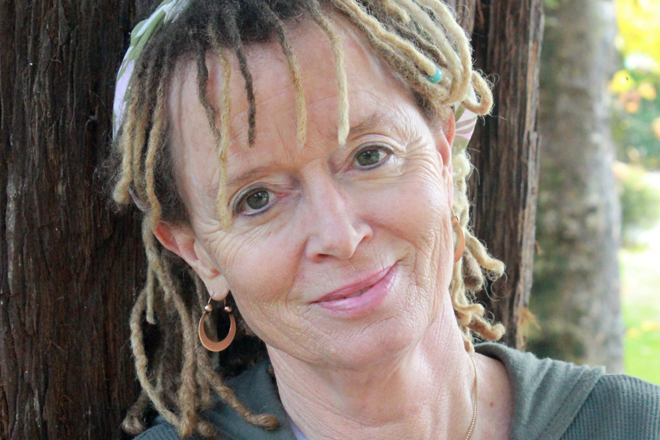By Heidi Stevens
Chicago Tribune
WWR Article Summary (tl;dr) Heidi Stevens takes a look at Anne Lamott’s new book “Hallelujah Anyway: Rediscovering Mercy”
Chicago Tribune
Anne Lamott is my Oprah.
She’s my pastor, my life coach, my book club leader and my personal trainer (except with words instead of reps: Ten more! You’re almost done!).
She’s not my therapist; I pay to see my therapist in person.
But Lamott’s wise counsel, dispensed in such gems as “Bird by Bird: Some Instructions on Writing and Life,” “Traveling Mercies: Some Thoughts on Faith” and “Operating Instructions: A Journal of My Son’s First Year”, has shaped my brain and heart in ways that are nearly impossible to measure.
So if she wants me to practice mercy, by golly, I’ll try.
“Hallelujah Anyway: Rediscovering Mercy,” is a clarion call to the better angels of our nature: Rise up. Forgive. Show a little grace, will ya?
“Mercy means compassion, empathy, a heart for someone’s troubles,” Lamott writes. “It’s not something you do, it is something in you, accessed, revealed, or cultivated through use, like a muscle. We find it in the most unlikely places, never where we first look.”
She meditates on the moments she received mercy, when she was addicted to alcohol, when she wrote an insensitive tweet about Caitlyn Jenner, when she stumbled as a parent. And she reflects on the moments she offered mercy, to others and herself.
“When you’re extending mercy and forgiving really impossible and annoying people, you may find you can extend forgiveness to annoying and impossible you,” Lamott told me. “It’s like Nautilus for the spiritual muscles.”
Lamott is a longtime progressive whose politics don’t mesh well with the Trump administration.
Her book, she says, is not necessarily a reaction to current events, but it offers a different lens through which to view them.
She writes about a pivotal event that occurred when she was 5, in the company of her dad and his fishing buddy. The moment, which I won’t reveal here, taught her to see herself as flawed and to tuck away her sense of safety.
“I was one of those extremely sensitive kids,” she told me. “I always found the world very overwhelming. No one thought to say, ‘It’s just wonderful to have such an open, tender heart, and your vulnerability is really something that will give you the most beautiful rewards of not thinking you’re in charge of so much or you have to be a bully or you have to be aggressive. It’s going to give you the truth of your really good self.’
“No one mentioned that,” she said. “What they said was, ‘Oh for Christ’s sake, Annie. Now what? You’ve got to get a thicker skin.’ Which is another way of saying, ‘You’ve got to be an entirely different person than who you are.’ ”
She learned, eventually, to extend mercy to her dad and his friend. And to herself.
“Life wasn’t black and white, good or bad,” she writes. “That was an impoverished way to see life, and people.”
But it’s a process, this mercy-extending. It’s hard to do and easy to forget how.
“Mercy means that we no longer constantly judge everybody’s large and tiny failures, foolish hearts, dubious convictions and inevitable bad behavior,” she writes. “We will never do this perfectly, but how do we do it better?”
(By deleting our Twitter accounts, probably.)
“Hallelujah Anyway” offers a more detailed road map.
“You don’t need special music and a Hollywood production and the Mormon Tabernacle Choir,” Lamott writes. “You don’t need the Canadian fjords, the Grand Canyon, a newborn baby, although these can be helpful. You don’t need to go to Senegal. Immediacy and inspiration can be found in the dairy aisle at Safeway. It probably looks like people saying hello, making eye contact, letting others go first.”
Letting others, the others that we other, into our lives.
“Polite inclusion is the gateway drug to mercy,” Lamott writes.
None of it’s easy. No one’s pretending it is.
“I like things to be more organized,” Lamott said. “I’d love for life to be more like a silverware drawer and put all the awful, terrifying things where the knives go and all the fabulous, beautiful, touching memories where the forks go, and where the spoons go would be all the curious things that make you wonder. But it’s not. Mercy and tragedy and devastation and resurrection and healing and woundedness all swirl together.
“But to focus on mercy means you see mercy more,” she continued. “It’s like you have a better pair of glasses on.”
You don’t stop seeing the pain, the conflict, the wrongheadedness. You certainly don’t stop speaking up against it. It’s just not all you see.
“All of it,” Lamott said. “And mercy, also.”
















































































































































































































































































































































































